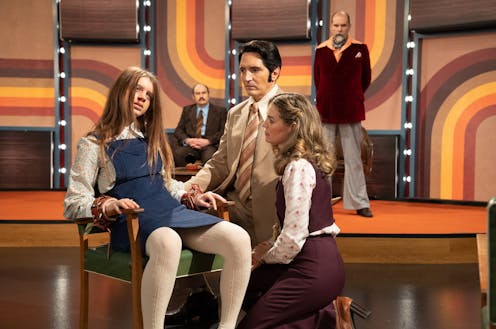Late Night with the Devil is a sly, gleefully horrifying Aussie hit that invites you to be hypnotised
- Written by Erin Harrington, Senior Lecturer in English and Cultural Studies, University of Canterbury

The ’70s-throwback found-footage horror comedy, Late Night with the Devil, joins a long list of recent Australian horror success stories.
Framed as a tabloid-style retrospective, the film invites us to watch the newly discovered footage of an episode from a late-night talk show, Night Owls, broadcast live on Halloween 1977. On this night it all went wrong, and evil was beamed into America’s homes.
While the film has encountered controversy over the authenticity of some of its elements, this debate actually illuminates the most playful aspects of found-footage horror. Such films ask us to pretend what we’re watching is authentic, even as we take pleasure in all the ways it’s being faked.
Read more: ‘An exceptionally queasy atmosphere’: the unsettling new Aussie horror You’ll Never Find Me
A highly entertaining plot
It’s sweeps week and ambitious TV show host Jack Delroy, played with impeccable charm and subtlety by David Dastmalchian, is desperate to finally take out the #1 spot.
In a bid to boost ratings, Delroy hosts a range of occult guests. They include a psychic, a magician-turned-sceptic and a parapsychologist. But the most important guest is a sweet young woman named Lilly (Ingrid Torelli). She was rescued from a cult that worshipped the demon Abraxas, and is apparently possessed.
The film riffs on a range of targets, such as the satanic panic that started in 1970s, grimy Hollywood lore, the flattened aesthetic of live television, and the tonal absurdity of the late-night format.
The subplot suggests Jack made a deal with a sinister entity to boost his career. As the live broadcast goes from ordinary to odd to completely unhinged, we realise this is the night Jack’s infernal debts, and wishes, will come due.
Criticism over AI use
The film has encountered controversy after a review criticising its use of AI-generated imagery went viral. The directors have since confirmed they “experimented” with the technology for three title cards used during Night Owls’ commercial breaks.
Notably, this experimentation was done well before generative AI became a key issue in the guild strikes that ground Hollywood to a halt last year. Yet the backlash, which included negative review bombing and calls for a boycott, generated far more heat than light.
It’s unclear what good might come to filmmakers, distributors and audiences from punishing a low-budget Australian indie horror for its perceived transgressions. But an unexpectedly strong US box-office reception indicates this may have made little difference.
Questioning is part of the fun
Interestingly, the furore over AI speaks directly to some of the questions posed by found-footage and “haunted media” films.
They prompt us to ask: can we believe what we see? Where did the footage come from? How might we be affected (or even harmed) by it? And what counts as an “authentic” image anyway – especially in a film that uses contemporary technology to painstakingly recreate a 50-year-old entertainment form?
Found-footage films ask us to become knowing participants in the film’s fiction, which means engaging with these questions is part of the fun.
Late Night With the Devil places us as a willing audience who might question the veracity of what we’re seeing, but who might also be as hypnotised (perhaps literally) by the events taking place in front of the studio audience.
The film speaks to historic fears about the place of technology in the home, including moral panic over the alleged harm television might bring to viewers. It also references the medium’s ability to bring actual horrors, such as images of war, into domestic living rooms.
Limits in marrying form and function
Like many films of the genre, Late Night with the Devil can’t always fulfil the significant constraints of the found-footage mode alongside the need to construct a compelling story arc.
This is especially obvious as we switch between the flat, impressively constructed multi-camera studio footage and additional verité-style black-and-white footage from behind the scenes. The latter charts the backstage panic and conflict very effectively, but there would be little reason for such archival footage to actually exist in the world of the film.
That said, the film maintains a sense of sly self-awareness, especially as the show descends into chaos. Delroy’s carefully calibrated “aw-shucks” Midwestern persona and his slick control of the show’s trajectory are hilariously destabilised as events unfold. His various offsiders can’t tell if the bizarre occurrences are real or a ratings stunt.
Subtle forms of visual manipulation give way to gleefully abject body horror. Some sequences even recall the practical horror effects boom of the late 1970s and early ’80s, and seem perfectly geared to the dark comic sensibilities of a midnight madness-style film audience.
The AI issue aside, the film’s thorough craftsmanship rewards multiple viewings. Its parodic take on American television and pop culture and its in-on-the-joke manipulation of material authenticity are enormous fun.
Perhaps Jack Delroy will finally be a ratings smash and we’ll witness the television event of the century. As we’re told in the film – with the possessed Lilly grinning down the barrel of the camera – the devil does love an audience, and we do love to watch.
Read more: Friday essay: in praise of the 'horror master' Stephen King
Authors: Erin Harrington, Senior Lecturer in English and Cultural Studies, University of Canterbury





